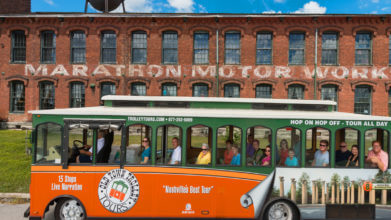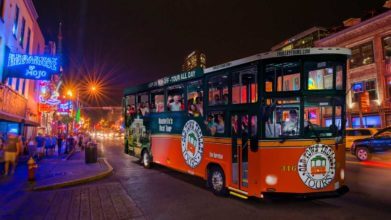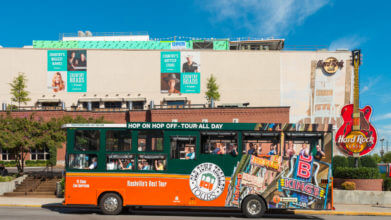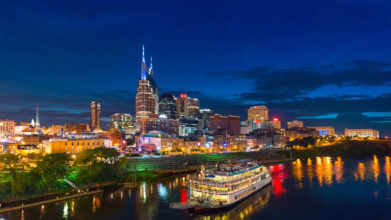Nashville Neighborhood Guide
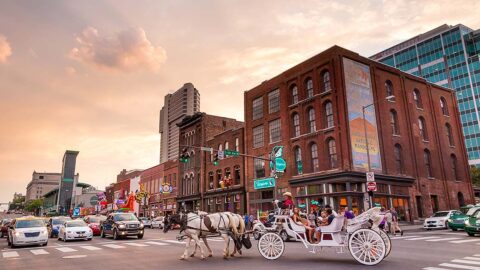
Nashville’s neighborhoods pulse with diverse energy, each a distinct facet of the city’s soul. From the bustling core of downtown to East Nashville’s trendsetting charm, from the Gulch’s chic boutiques to 12 South’s family-friendly warmth, and from Germantown’s historical echoes, each district sings its own tune. This guide delves deeper, exploring local gems, cultural corners, and unique offerings that make each neighborhood a captivating piece of the Nashville puzzle. Whether you’re a music maven, a foodie on the hunt, a history buff, or a shopping devotee, Nashville’s neighborhoods hold experiences that ignite your passions. Join Old Town Trolley Tours on a journey of discovery, and see what makes each neighborhood a vibrant note in the city’s symphony.
Insights About Different Neighborhoods in Nashville
Broadway
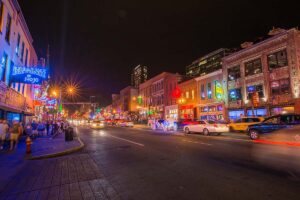
History
Broadway’s roots in Nashville, Tennessee stretch back to its 19th-century beginnings as “The Strand,” a bustling commercial heart. Banks, shops, and hotels hummed with activity, forming the backbone of the growing city. But, by the early 20th century, Broadway’s beat began to shift. Live music took hold, and the first honky-tonks sprouted in the 1920s, drawing in locals and visitors alike with their infectious energy. The 1940s saw a seismic shift. The iconic Grand Ole Opry, a weekly country music showcase, planted its roots on Broadway, forever cementing the district in country music history. This wasn’t the end of the story. The 1960s brought a wider range of musicians, from rock-and-roll to blues, to the stage, solidifying Broadway’s reputation as a global music hub. Today, Broadway remains Nashville’s pulsating artery, a testament to its history and enduring appeal for music lovers worldwide.
Things To Do
- Broadway in Nashville is a hub for live music, dining, and shopping.
- It has evolved from a bustling 19th-century commercial district into a world-renowned music destination.
- Over 100 music venues line its streets, showcasing the soulful melodies of country, the electrifying energy of rock, and the bluesy rhythms of the American South.
- Broadway was home to the first honky-tonks, casual bars where country music legends were born, and the famed Grand Ole Opry, a weekly country music stage concert that has become an institution.
- Visitors can immerse themselves in the city’s rich musical heritage by catching live music performances, browsing for unique souvenirs, and exploring historic sites.
- The Ryman Auditorium, a historic venue with an iconic horseshoe-shaped stage, has hosted musical legends like Elvis Presley, Johnny Cash, and Patsy Cline.
- A visit to a lively honky-tonk is an essential part of the authentic Nashville experience, offering a taste of the city’s unfiltered musical spirit.
East Nashville
About
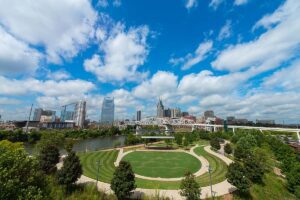
History
East Nashville’s story starts in the early 1800s when farmers and traders carved a life from the land. It lived its own life for almost a century, a proud neighbor to Nashville but not quite part of it, until 1890 when they joined forces. The early 20th century saw industry roar to life, with factories like the Southern Railway repair shops humming with activity. But by mid-century, the industrial tide had turned, leaving East Nashville quieter. Then, in the 1990s, a remarkable shift began. Affordable homes and a stone’s throw from Downtown Nashville drew in artists and musicians like moths to a flame. Their creative spark ignited a transformation. Quirky shops, diverse restaurants, and lively bars bloomed, weaving East Nashville into the tapestry of the city. Today, it’s a destination for residents and visitors alike, a place where history whispers and creativity sings.
Things To Do
- A Harmonious Blend of Retail, Culinary, and Artistic Culture: East Nashville is renowned for its unique fusion of retail, culinary, and artistic experiences and dynamic atmosphere.
- Steeped in History: The neighborhood’s rich history dates back to the early 19th century, marked by remarkable transformations over the years, reflecting its adaptability and resilience.
- A Haven for Eclectic Shops, Diverse Dining, and Thriving Arts: East Nashville is celebrated for its eclectic mix of shops, diverse restaurants and bars, and thriving art scene catering to a wide range of tastes and interests.
- A Creative Hub Attracting Artists and Musicians: In the 1990s, the neighborhood emerged as a creative haven, drawing artists and musicians seeking an affordable and artistically stimulating environment, fostering community.
- Five Points: Street Art, Boutiques, and Antique Shops: The Five Points area beckons exploration with its amazing street art, unique boutiques, and antique shops, offering a delightful blend of urban art and vintage charm.
- Fatherland Street: A Must-Visit Destination for Popular Shops and Restaurants: Fatherland Street stands out as a must-visit locale, known for its collection of popular shops and restaurants providing a diverse culinary and retail experience.
- East Nashville Farmers’ Market: A Bounty of Fresh Produce and Artisanal Goods: Every Saturday morning, the East Nashville Farmers’ Market showcases a cornucopia of fresh locally sourced produce and artisanal goods, offering a taste of the region’s bounty.
- Cumberland River Greenway: A Tranquil Escape With Breathtaking City Views: The Cumberland River Greenway provides a tranquil and scenic route for walkers and cyclists, offering breathtaking panoramic views of the city, creating a harmonious blend of nature and urban beauty.
The Gulch
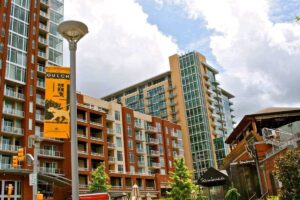
History
Once a bustling railroad yard, its tracks echoed with the clang of metal and the rhythm of hard work. It was the industrial heart of Nashville, beating with the pulse of progress. But as the 20th century neared its end, a vision for a new chapter began to take shape. The early 2000s saw the Gulch embark on a bold transformation. From the clattering yard to the sparkling hub, it shed its working-class skin and embraced a mixed-use future. Homes rose where trains once rumbled, stylish shops took root beside repurposed warehouses, and upscale eateries replaced weathered sidings. The Gulch was reborn, a seamless blend of work, living, and play.
Things To Do
The Gulch: From Industrial Heart to Urban Hub
- Eat at a trendy restaurant: The Gulch is not only known for its many shopping and entertainment options but also for its dining scene. With a variety of trendy restaurants to choose from, there is something for every taste and occasion. Some of the most popular restaurants in the Gulch include The Catbird Seat, Etch, and Husk.
- Shop at unique stores: The Gulch is a shopping destination unlike any other. Its unique stores offer a wide variety of products, ranging from trendy clothes and statement jewelry to high-quality home goods and beautiful art pieces. With so many options to choose from, you’ll be sure to find something that catches your eye.
- Enjoy Some Live Music: If live music is your thing, then the Gulch is the place to be! With a variety of venues showcasing talented artists, you’ll never run out of options for a good time. From intimate shows at the Basement East to larger concerts at Cannery Hall, there’s something for everyone in this vibrant neighborhood. So, grab your friends and head to the Gulch for a night of great music and unforgettable memories. Don’t forget to check out the local bands that often play at these venues. You never know when you might discover your new favorite artist.
- Visit Railroad Yard: Railroad Yard Gulch is your portal to the city’s industrial past. Immerse yourself in the sights and sounds of a bygone era, where trains ruled the rails and commerce thrived. Train enthusiasts, unite! Get up close to iconic locomotives, explore historic tracks, and capture the essence of railroading heritage in every photo.
- Visit Hops and Crafts: Escape the ordinary and immerse yourself in the magic of Hops and Crafts Gulch. Framed by the Rockies’ grandeur, this charming haven offers tranquility and adventure in equal measure. Hike majestic peaks, unwind by babbling brooks, and savor farm-to-table delights. Whether you’re a seasoned adventurer or seeking a peaceful retreat, Hops and Crafts Gulch has something for you.
- “What Lifts You” mural: Nashville’s Gulch neighborhood holds a hidden gem: Kelsey Montague’s “What Lifts You” mural. This larger-than-life artwork, featuring a pair of majestic wings, beckons you to step into its frame and capture a memorable photo. But this mural is more than just a photo op; it’s an invitation for self-reflection. Whether you’re an artist seeking inspiration or a traveler yearning for a unique experience, this interactive masterpiece encourages you to discover what truly lifts your spirit.
Germantown
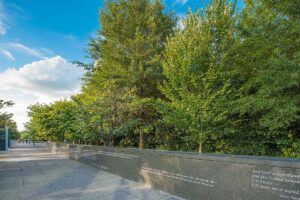
History
The heritage of the Germantown neighborhood in Nashville, Tennessee, is deeply rooted in its early settlement in the 1800s by German immigrants. These early settlers, predominantly farmers and craftsmen, were drawn to the area’s proximity to the Cumberland River and its fertile farmland. Their establishments, comprising homes and thriving businesses, were strategically situated along the river and across the picturesque countryside, solidifying Germantown’s position as the heart of the local German-American community. The neighborhood underwent a remarkable transformation in the mid-19th century, fueled by a rapid population growth that doubled the number of residents. This era was marked by a flourishing of business activities and the establishment of new industries. Notably, Germantown emerged as a prominent brewing and distilling center, housing numerous breweries and distilleries. This tapestry of historical events and developments has exquisitely woven the Germantown we know today, a testament to its dynamic past and enduring charm.
Things To Do
- Germantown, located in Nashville, is a lively district offering numerous activities for various interests.
- History buffs can immerse themselves in local heritage at the Germantown Historical Society Museum.
- Shoppers will appreciate the unique finds at Germantown Merchants.
- Cultural experiences can be found at the Germantown Performing Arts Center and the historic Germantown Baptist Church.
- Nature enthusiasts will enjoy Nashoba Park and Oaklawn Garden.
- The Sabah Sandi Church adds another layer of intrigue to Germantown’s fabric.
12 South
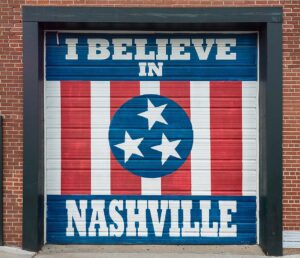
History
12 South, a distinct neighborhood in the heart of Nashville, boasts a history that has profoundly shaped its character. Initially a residential area, 12 South underwent a notable transformation in the early 2000s, attracting a wave of artists and entrepreneurs drawn by the neighborhood’s affordable rents and convenient proximity to Downtown Nashville. This gentrification process has defined 12 South as a neighborhood renowned for its artistic flair, entrepreneurial spirit, and enduring historical allure.
Things To Do
- Art immersion: Marvel at the iconic “I Believe in Nashville” mural, a symbol of the city’s cultural pride.
- Fine dining and casual eats: Indulge in diverse culinary options, from gourmet grilled cheese at the Grilled Cheeserie to fluffy pancakes at Pancake Pantry or succulent steaks and oysters at the Southern Steak and Oyster.
- Fresh finds: Browse local produce and artisanal goods at the bustling 12 South Farmers’ Market every Tuesday.
- Spiritual reflection: Step into the historic Hicks Tabernacle Baptist Church, a testament to the neighborhood’s rich past and community spirit.
- And more! Explore a variety of trendy boutiques, art galleries, cafes, and shops to further personalize your 12 South experience.
West End

History
West End’s story whispers through its streets, tracing back to the late 19th century. Streetcars once carried affluent Nashvillians here, seeking refuge from the city’s bustle. Grand homes, draped in Queen Anne, Colonial Revival, and Tudor Revival finery, stand as silent sentinels of that opulent past. Churches like West End United Methodist and West End Presbyterian echo with the whispers of generations. But, West End’s story isn’t just one of wealth and white steeples. In the early 20th century, it became a haven for African Americans shut out from other parts of Nashville. Black-owned businesses flourished, and cultural institutions like the Pearl Theater and Zion Chapel AME Church bloomed, weaving threads of resilience and community into the neighborhood’s fabric. Today, West End’s architectural echoes and historical whispers blend with the diverse energy of its residents. It’s a place where grand facades hold stories of opulence and struggle, where church bells mingle with the thrum of modern life. This is West End, a neighborhood where history whispers and resilience sings.
Things To Do
- Centennial Park: One of the city’s premier parks, Centennial Park is a vast urban green space that hosts various events throughout the year. The park features a walking trail, a lake, historical monuments, and an arts activity center, providing a relaxing space for both recreation and contemplation.
- The Parthenon: Located in Centennial Park, the Parthenon is the world’s only full-scale reproduction of the ancient Parthenon in Athens, Greece. It also houses an art museum, featuring a collection of 19th and 20th century American painters. This unique attraction is a must-visit for history and art enthusiasts.
- Nashville Pedal Tavern: For those seeking a unique way to explore the neighborhood, the Nashville Pedal Tavern offers a pedal-powered group tour of West End’s most popular bars and eateries. It’s a fun, social way to discover new places and make some new friends along the way.
- Adventure Science Center: An educational, family-friendly destination, the Adventure Science Center offers interactive exhibits and planetarium shows that bring scientific concepts to life. It’s a great place for kids and adults alike to learn and have fun.
- Elliston Place: Often referred to as “Rock Block,” Elliston Place is home to some of Nashville’s legendary music venues. From the late-night live music shows to its iconic “soul food” restaurants, Elliston Place encapsulates the spirit of Nashville.
FAQs
What are the best neighborhoods to stay in when visiting Nashville?
Choosing the right neighborhood in Nashville can significantly enhance your visit. Here are two excellent options to consider:
Downtown Nashville: The heart of the city, Downtown Nashville is home to iconic landmarks such as the Country Music Hall of Fame and the Ryman Auditorium. It pulsates with the city’s colorful nightlife and is a must-visit destination for music lovers.
The Gulch: This trendy neighborhood exudes style and sophistication, brimming with high-end boutiques, sleek apartments, and some of Nashville’s most acclaimed restaurants. It’s an ideal choice for foodies and those seeking an upscale urban experience.
Remember, the best neighborhood for you will depend on your individual preferences and the unique experiences you seek during your Nashville adventure.
Which neighborhoods have the best nightlife in Nashville?
When it comes to nightlife in Nashville, two neighborhoods stand out. Downtown Nashville, the city’s heart, is renowned for its pulsating energy that extends into the night with iconic music venues and bustling bars. It’s a must-visit for those looking to immerse themselves in the city’s music scene. Another neighborhood known for its lively nightlife is the Gulch. This upscale area boasts a myriad of popular restaurants and chic lounges, making it a great choice for those interested in a more sophisticated evening ambiance. Both these neighborhoods offer a diverse selection of entertainment options that cater to a variety of preferences, making them the top picks for the best nightlife in Nashville.
Which neighborhoods offer the best shopping in Nashville?
For shopping enthusiasts, 12 South and the Gulch are the go-to neighborhoods in Nashville. 12 South is renowned for its treasure trove of chic boutiques that offer a wide selection of fashion-forward pieces, unique accessories, and artisan goods. It’s the perfect place for those looking for distinctive and stylish finds. Conversely, the Gulch is known for its high-end boutiques that feature designer brands and luxury items. Its well-curated stores cater to those with a taste for the finer things in life. Whether you’re hunting for the latest fashion trends or unique pieces to add to your collection, these neighborhoods offer a delightful shopping experience.
Which neighborhoods in Nashville have a historic charm and architectural significance?
When it comes to historic charm and architectural significance, Germantown and Belmont-Hillsboro are the standout neighborhoods in Nashville. Germantown, Nashville’s oldest suburb, is adorned with beautifully restored Victorian buildings and brick sidewalks that take you back in time. It’s home to the Bicentennial Capitol Mall State Park, offering insights into Tennessee’s history. Conversely, the Belmont-Hillsboro neighborhood is known for its tree-lined streets and diverse architectural styles, including Craftsman bungalows, stone cottages, and Tudor Revival homes, representing early 20th-century American suburban development. Both these Nashville neighborhoods, steeped in history and heritage, offer a glimpse into Nashville’s past.

